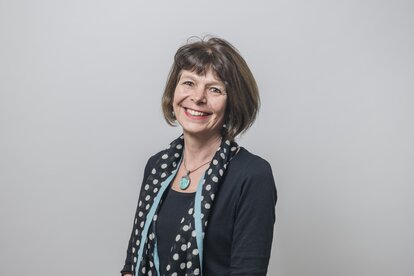with Rubika Shrestha
Kamala and Rubika greet each other warmly – they have become good friends over the time that Rubika was working in the Surkhet/Dailekh area as part of the Helvetas Integrated Water Resource Management (IWRM) team. Having spent ten years working in the field, Rubika is now IWRM Monitoring Coordinator, based in Kathmandu. On this occasion, we are visiting the water quality laboratory that has been established at the Health Post in Tiyadisthan, ward 3 of Dullu municipality in western Nepal (state 6) in collaboration with EAWAG, the Swiss Federal Institute of Aquatic Science and Technology. “Laboratory” perhaps gives a wrong impression, as it is one rather bare room in the health post, equipped with basic supplies: a portable solar powered incubator and other materials necessary for testing microbial presence in water samples. Whilst simple, it is in a way revolutionary, as it is one of only two microbial water quality testing laboratories in the country that is based outside a large town. As water samples must be tested for E. coliwithin two hours of collection, it enables a local monitoring of water quality that was previously impossible. This is an important part of the overall WASH – water, sanitation and hygiene – activities supported by Helvetas in the area. WASH activities also include awareness-raising on menstrual hygiene, and it was this that brought Kamala Karki and Rubika together.
The practice of chhaupadi (Rubika Shrestha)
During my regular visits to different villages of Dullu in the past, I quickly became aware that chhaupadi – the practice of banning women from the house when they are menstruating – was widespread. I was really shocked by this, as in the community in which I was born and bred, we do not have such a custom, and I found it so upsetting and degrading to women. Menstruating women here are expected to sleep in small, specially constructed huts or even cowsheds. The conditions are often very unhygienic and can even be dangerous – there are cases of asphyxiation from poor ventilation of fires, and of snakebite. Furthermore, women are not allowed to wash or to use the family toilet whilst they are menstruating, and are expected to go to distant water sources instead of using local ones. This means that they are susceptible to infections – and that community sanitation is undermined. I was particularly concerned, however, about the effect on women’s mental outlook. Chhaupadi reinforces a community belief that women are inferior to men, and are “polluting” to others when menstruating.
I talked with many women here about breaking the custom of chhaupadi – of refusing to take part in it. Kamala and I first met when she was sitting in a chhaupadi hut, and she quickly understood my message. We shared many things about our lives, and although she knew that challenging the local priest and jankri (traditional healer) on chhaupadi would be difficult, she agreed to try. Her husband is working in India, but she explained to him over the phone and he supported her. So whilst I was here, she defied local norms, and slept in her house when menstruating. When I left, people began to speak badly of her, and her courage started fading. So I keep a track of her menstrual cycle as well as my own, and every month when it is about time for her period, I call her and remind her how important it is to take care of herself, and to sleep inside her house.
In affirmation, Kamala added, “Even though it is often difficult to hear each other’s voices on the phone – the reception here is poor – it is so reassuring to know that Rubika is thinking of me from far away.”
Changing mindsets in the community
Kamala is not alone in Tiyadisthan in refusing to practice chhaupadi; she has friends and neighbours who are doing the same, gradually breaking down societal expectations. Nevertheless, it is not easy; for example, Maya Karki, whose father-in-law is the local priest, admits that she is sometimes still forced to sleep outside.

The same afternoon, we visit another community in the settlement of Kadalpani, Dullu-2, where we talk to more women who are all still practicing chhaupadi. This is despite it being an area in which Helvetas supported WASH activities for some time. None of the women are happy with the practice; they know it is unhealthy, and some are also aware that it is illegal. So why continue? “Our god will be angry if we defy him” explains Dhani Thapa. Bhuban Thapa (seated in the photo outside a chhaupadi hut) adds, “My husband does not see the need to practice chhaupadi – so once when my two-year old son was crying and asking for me to sleep inside, he let me. Shortly afterwards, a relative fell sick. The jankri told my husband that the reason was that chhaupadi was not being practiced in his house. So what to do? I cannot be seen to be willfully risking the health of my relatives.”
In furthering its campaign to promote WASH, and menstrual hygiene in particular, Helvetas is working closely with local priests and jankris, as well as through schools and with local politicians. Combatting chhaupadi needs strong women prepared to take a stand – but it also needs a whole change of community mindset.
The headline photo shows Rubika (in blue) and Kamala on her right.



